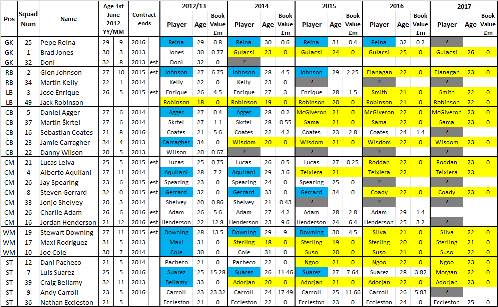
By Dan Kennett.
Dan Kennett looks at the plans that FSG may have in place for Liverpool F.C.; examines the criteria likely to be applied to the project; and explains what part project management could play in the future of Liverpool F.C.
Darling: Listen… Our guns have stopped.
George: You don’t think…?
Baldrick: [with rising hope] Maybe… the war’s over. Maybe it’s peace!
George: [overjoyed] Oh, hurrah! The big knobs have gone round the table and yanked the iron out of the fire!
Darling: [also overjoyed] Thank God! We lived through it! The Great War, 1914 to 1917!
George: Hip-hip…
George, Baldrick and Darling: HOORAY!
Blackadder: [sadly] I’m afraid… not. The guns have stopped because we’re about to attack. Not even our generals are mad enough to shell their own men. They think it’s far more sporting to let the Germans do it.
George: [afraid] So we are, in fact, going over? This is, as they say, “it”?
Blackadder: I’m afraid so. Unless I can think of something very quickly.
Captain in background: COMPANY, ONE PACE FORWARD! [the group obey]
Baldrick: I have… a plan, sir.
Blackadder: Really, Baldrick? A cunning and subtle one?
Baldrick: Yes, sir.
Blackadder: As cunning as a fox who’s just been appointed Professor of Cunning at Oxford University?
Baldrick: Yes, sir.
Captain in background: ON THE SIGNAL, COMPANY WILL ADVANCE!
Blackadder: Well, I’m afraid it’ll have to wait. Whatever it was, I’m sure it was better than my plan to get out of this by pretending to be mad. I mean, who would have noticed another madman round here? [a whistle is heard] Good luck, everyone.
One criticism we’ve heard a lot about Liverpool Football Club recently is that “there doesn’t appear to be any kind of strategy or plan”. From the debates I have seen, the main evidence cited to the lack of a plan seems to be:
- The transfer policy
- The 1st team playing a different system to all the reserves and academy sides
- The constant changing of systems and personnel
Personally, I don’t subscribe to the view that just because there is uncertainty as to what the plan is doesn’t mean there isn’t one. Also, whether it’s a good plan or not is a completely different question.
What I want to do in this post is simply try and imagine what a “plan” for the football side of Liverpool could look like because if we are talking about “strategies” and “plans” we have to imagine that Liverpool Football Club is a project. Every project has to operate under the triple-lock of Cost, Time and Scope/Quality and I want to try and translate this to a football club. It’s a triple-lock because all three properties are interrelated and it’s impossible to optimise all of them, something always has to give.
When you initiate a project you don’t start by talking about “cost”, “time” and “scope”, you start by finding out which of the three properties will be sacrificed. You do this by giving your sponsor/client/manager the options of FAST, GOOD and CHEAP and asking them to ‘pick any two’.
i.e.
- You can have something “fast” and “cheap” but it will not be high quality
- You can have something “fast” and “good” but it will be expensive
- You can have something “good” and “cheap” but it will take a long time
At some point at the end of 2010, FSG, Comolli, Dalglish, Segura et al will have sat down, set out their objectives and asked these kind of questions. If we take FSG at face value then their objective is to genuinely challenge for the top honours within three to five years. How to meet those objectives is up for debate. So what do we know and what kind of plan might it be?
Cost (Budget)
This is one of the few areas that FSG have given us very clear message on. In an interview with David Conn of The Guardian in February 2011, John Henry said:
“We’ve always spent money we’ve generated rather than deficit-spending and that will be the case in Liverpool,” he said, referring to the group’s ownership of the Boston Red Sox baseball team. “It’s up to us to generate enough revenue to be successful over the long term. We have not and will not deviate from that.”
We could also add in the UEFA Financial Fair Play rules here because we know that their existence was one reason they bought Liverpool in the fair place and we know that they are hoping UEFA strictly implement the rules that came into effect June 2011.
Time
In another interview about a month after takeover the following was revealed:
Henry confirmed his support for the changes made at youth level last summer, when Frank McParland returned to the club as academy director and appointed two former Barcelona youth coaches, José Segura and Rodolfo Borrell, with a view to replicating the Spanish champions’ production line.
“We need top four young players,” Henry said. “They will not produce a quick fix but our philosophy in football will be based on the long-term. That is what has made Arsenal and Manchester United so strong. They understand something we understand in Boston – to be consistently strong on the field you must have a consistent flow of young talent that has been nurtured and developed the right way. We will focus on that.”
Scope/Quality
In the David Conn interview, John Henry also said:
“We intend to get younger, deeper and play positive football”
While in the other interview:
“There were a number of unpleasant surprises during our due diligence. The wage bill is high, it’s going to be higher next year and we’re not a young team. That was disappointing,”
In a 3rd interview shortly after takeover, the following was also revealed:
“Our mantra has been to under promise and over deliver. When we came into Boston we were given a short window. We understand the impatience of fans, but our intention is to build a great club from the foundation up,” Werner said. “Our intention is to find the very best people. It would be crazy to promise too much too soon, but I hope our track record is a guide that we are successful operators.”
The FSG Plan?
From these numerous public statements it looks to me like option 3. The goal is to have something “good” and “cheap” whilst time is compromised as every statement is geared towards long-term planning and success.
Scope/Quality seems to be the main driver, with plenty of depth and a steady “production line” from the academy.
In terms of budget, I don’t doubt that every available penny will be reinvested in the team but we will have to live within our means, both from an internal FSG policy of no deficit spending and the external constraint of UEFA FFP. In this sense “cheap” is relative. Liverpool will spend a lot by most clubs’ standards, after all the Deloitte Football Money League 2012 still has Liverpool in 9th place (meaning Liverpool generate the 9th most revenue in all of Europe) despite not being in the Champions League. There’s also a huge amount of scope for FSG to increase the budget simply by running the club well. We’ve had a top 4 wage bill for years but so much is wasted on players who don’t have a big impact on the first team winning (e.g. Cole & Aquilani c£9m a year to play their football somewhere else). On the revenue side, Liverpool have been commercial amateurs since the onset of the Premier League and must be the most under-exploited brand in European football. You only have to see the shirt sponsorship almost doubling under Warrior (from £13m p.a. to £25m) to understand what FSG can bring to the table. Simply by doing a competent job they could cut £15-20m from costs and increase commercials by £20-30m within three years.
The critical unknown is whether there is a big assumption in the plan that FFP will make Liverpool’s budget more competitive over time. Our budget is huge by most team’s standards but we can’t compete with the likes of Man City and Chelsea. However a strict enforcement of FFP could make our budget extremely competitive due to our massive revenues, even without the new stadium.
Based on this assumption of a long term plan, I’ve compiled a “plan” of how the positions in the first team squad could evolve over the next five years. Every first team squad player over the age of 23 is planned to be succeeded by a graduate from the Academy (highlighted in yellow)
Also present is the “book value” of each player based on how their transfer value is accounted for over the length of their contract. Book value is important as this is the number that needs to be considered when selling a player to understand if the club will make a profit or a loss in the accounts. As a hypothetical example, if Alberto Aquilani was to return to the club this Summer, his book value would be £7.2m. If he was subsequently sold for £5m [we wish – Ed] that would mean an accounting loss of £2.2m. 
For a larger image please click here
Once planned out at this high level it’s then possible to ask a series of important questions.
Resources
e.g. Left Back. Is Jack Robinson ready to be 2nd choice left back? Can two relatively injury-prone players like Johnson and Kelly provide the necessary cover for both fullback positions? Now Kuyt has left, are there enough players to cover the wide midfield positions?
Conversely, are there areas where we are overstaffed? Seven first team players for two or three central midfield positions would suggest so.
Quality
Are we getting value for money from our big contracts? The club can afford a number of players on “Champions League” salaries (highlighted in blue). These players should bear the primary responsibility for achieving results for the first team. Underperformers here represent significant problems for the club (see here for more).
Risk
In terms of succession planning, will the academy graduates be “ready” to join the first team squad at the anticipated time? If not, then corrective action will be needed and a new player signed.
Based on each player’s susceptibility to injury, will the squad have enough players to cover the matches in the coming season?
Conclusions
A bit of fun? Perhaps. Applying project management principles where we ultimately have limited information can only get us so far. After all, what we are missing are the key numbers: what is the actual budget? What are the precise objectives?
What’s important to remember is that anyone trained to manage a project will think in these terms and these are just the basics. The possibilities for more advanced techniques (e.g. quantitative analysis) are almost limitless.
However, if it is indeed a long-term plan based on quality then that definitely presents a challenge to fans as time and patience are often in very short supply – as James Keen’s recent piece confirms.

